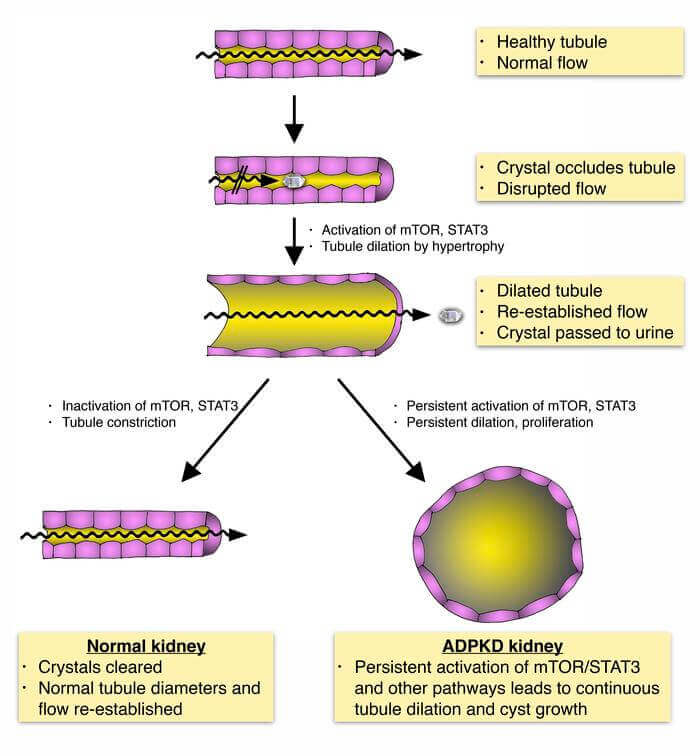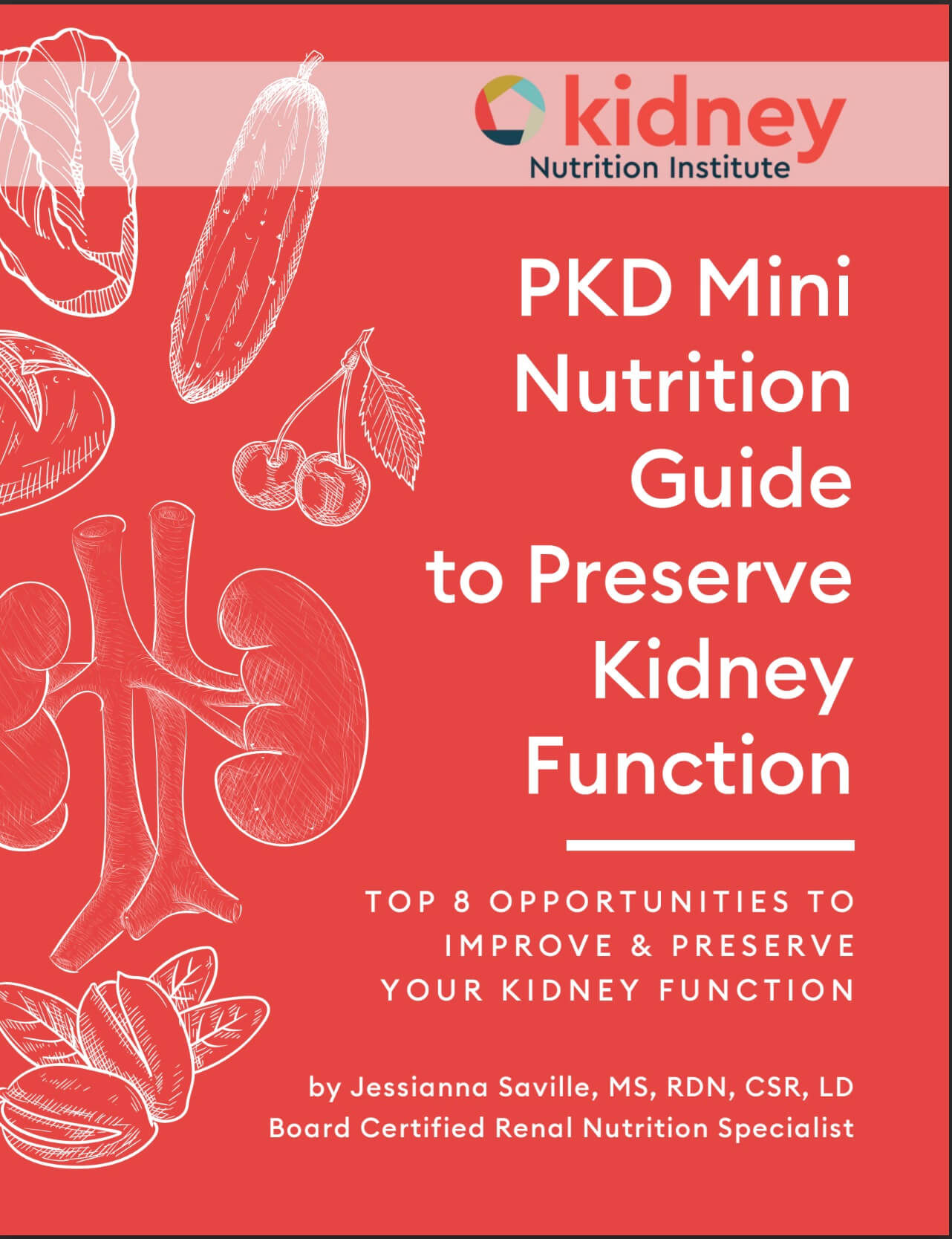For Week 2 of PKD awareness month, we’re talking all things oxalates and plants! Read on to learn how managing oxalates can impact the progression of PKD and why it’s so important to eat more plants!
Manage Don’t obsess over Oxalates

What are Oxalates?
Oxalates are naturally occurring substances in plants that do not provide any nutritional purpose or function for humans. So, as a result, when we eat them- we excrete them.
Even though we have no use for oxalates, most foods containing oxalates are healthful and nutrient-rich, like fruits, vegetables, and nuts. Any food from a plant source has the potential to have oxalates though each food has different amounts.
Although we primarily consume them through diet, oxalates are also produced as waste by our bodies.
What’s the big deal about oxalates?
A critical function of the kidneys is to remove waste products from the body through urine. One of these waste products is oxalates. If there is too much oxalate in the urine, it can form small crystals.
If an abundance of crystals forms inside the kidneys, they can cause damage to kidney cells, stimulate PKD cyst pathways through tubule dilation, and form kidney stones. The most common compounds that form kidney stones are calcium oxalate, calcium phosphate, and uric acid in humans.
Research led by the Weimbs laboratory at the University of California in Santa Barbara, in collaboration with many other kidney experts, has demonstrated that crystal precipitation in the kidneys of animal models with PKD accelerates renal cyst formation and disease progression. (1)

Because individuals with PKD are at higher risk of developing calcium oxalate kidney stones, prevention is an essential goal of nutrition therapy!
How do we manage oxalates?
There are many ways to manage oxalates to prevent stone formation, learning why is a great first step! We highly recommended working with a Registered Dietitian to put an actionable plan in place that works for you, your life and is specific to PKD. In a nutshell, here are a few of our favorite strategies for managing oxalates!
Limit high oxalate foods:
Many healthful, kidney-protective foods contain varying amounts of oxalates. Removing all of these foods strips your diet of their nutrients and nutritional benefits. Understanding which foods contain the most oxalates is an important way to limit them. We love using searchable oxalate guides like Jill Harris’ Oxalate Food List or Oxalate Counts.
While we encourage limiting oxalates, it’s best to avoid the highest oxalate foods; beets, rhubarb, almonds, and spinach.
Pair a calcium source with an oxalate source:
It may seem counterintuitive because oxalates can turn into calcium oxalate stones, but trust us on this one! Oxalate and calcium attract one another. So when we eat high oxalate foods at the same time as a good calcium source, they will bind together in the gut and not the kidneys!
Calcium-rich food sources include dairy, tofu, calcium-fortified plant milk (avoid almond milk), kale, or bok choy. If you don’t enjoy these foods or have to avoid them for other reasons, a calcium supplement may be an option.
Calcium supplement caveats:
Calcium supplements must be taken with food to bind to oxalate in the gut and not the kidneys. Also, taking too high of a dose of calcium supplements is not recommended because they may cause kidney stones.
We recommend working with your physician or a Renal Dietitian to help personalize calcium goals and find the best source for you!
Consider Citrate:
Citrate concentration in the urine has a direct link to the risk of developing calcium-containing kidney stones. Therefore, low urine citrate levels (hypocitraturia) is associated with stone formation, while higher levels of urine citrate can inhibit stone formation. (2)
A study from 2003 showed that the progression of ADPKD in rats slowed dramatically with the addition of citrate. (3) Research conducted by Weimbs labs also concluded that in human PKD patients, the concentration of urinary citrate inversely correlates with faster disease progression. (4)
So how can you increase the amount of citrate in your urine? By consuming more citric acid! Many fruits and vegetables contain citric acid, but the most common source is citrus fruits, especially lemons and limes. Some of our favorite ways to increase citrate in the diet are:
- Add freshly squeezed lemon to water
- Make lemonade
- Add lemon or lime to salad dressings or meals
- Eat at least 3 cups of vegetables per day!
If you haven’t heard, the medical food KetoCitra, used in the Ren.Nu program is now available! KetoCitra is formulated with calcium, magnesium, and citrate to prevent oxalates from forming stones in the kidneys.
Pick more plants

The Plant-Focused Ketogenic Diet (PFKD) was developed by the Dietitians at Ren.Nu in collaboration with Thomas Weimbs and Santa Barbara Nutrients. The focus is whole foods, primarily plant-based, and created to impact cyst growth while not causing further damage to your kidneys.
Plant-focused keto is full of vegetables, some fruit (yes!), nuts, seeds, lots of healthy fat, and some tofu. Also included are smaller amounts of eggs, cheese, yogurt, and fish. We included these foods because of their excellent fat profiles, vitamins and minerals, and omega-3 fatty acids.
And yes, there is zero concern about not meeting your protein needs. Plant-focused isn’t just about limiting carbs; it is about adding in nutrients and foods beneficial to every aspect of your health!
What’s the difference between plant-based and plant-focused?
We know that the term plant-based can be confusing, so let’s start by clearing up any confusion.
The terms plant-based, plant-focused, plant-forward, or plant-dominant describes an eating pattern primarily made up of plants.
A plant-based diet may or may not include small amounts of animal products like meat, dairy, and eggs. There are no hard and fast rules, and it is a personal preference.
On the other hand, the terms vegan and vegetarian are clearly defined. The vegan diet excludes all animal products, while the vegetarian diet excludes animal flesh but may or may not include eggs and dairy products.
Why do we practice PLANT-FOCUSED KETO?
There are so many reasons; it is impossible to go into them all with a single post. But, most importantly, it is kidney protective!
A few highlights of the benefits of a PLANT-FOCUSED diet:
- Improved blood pressure management
- Decreased protein in the urine (proteinuria)
- Decreased inflammation
- Reduced uremic toxins
- More alkali producing
- Increased citrate intake
- Decreased phosphorus absorption
- Reduced uric acid intake
- Decreased metabolic acidosis
- Reduced stress for your kidneys
- Rich in fiber
- Nutrient-dense
- Hearty Healthy
- And last but not least…..it is delicious!
Diet Matters for PKD!
For people with PKD, being mindful of oxalates and eating more plants are two essential ways to care for your kidneys!
Oxalates are naturally occurring substances found in plants. Oxalate crystals can be a daily kidney tubule stressor and contributor to renal injury and cyst growth. Prevention of that daily stressor by managing oxalate intake is a vital part of a solid nutrition plan!
But that doesn’t mean you’re off the hook from eating plants! A plant-focused diet offers so many benefits, but most importantly, they are a must-have for kidney health! Check out our keto kidney vegetable stir fry that is chock full of low oxalate plants!
If you want to learn more about the science-based nutrition approach designed for people with PKD, visit the Ren.Nu PKD Nutrition program. Ready to get started? Join the waitlist for the next available program, or schedule your free discovery call today!

